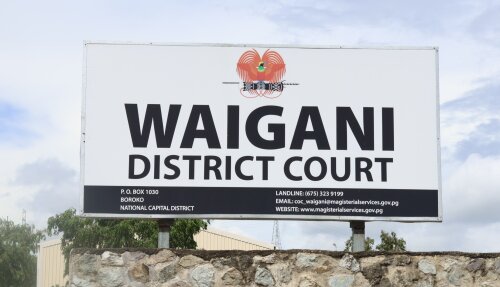Best Bail Bond Service Lawyers in Papua New Guinea
Share your needs with us, get contacted by law firms.
Free. Takes 2 min.
Or refine your search by selecting a city:
List of the best lawyers in Papua New Guinea
About Bail Bond Service Law in Papua New Guinea
Bail Bond Services in Papua New Guinea provide an option for individuals to secure temporary release from custody while awaiting trial. This system allows accused individuals to continue their daily lives while their legal proceedings are underway, on the condition that they will return to court for their hearing. The bail bond acts as a guarantee to the court that the accused will appear for their trial. The process is subject to certain legal frameworks and regulations governed by the judiciary system of Papua New Guinea.
Why You May Need a Lawyer
Legal advice or representation might be necessary in the following situations regarding bail bond services:
- If you're facing charges and need to secure a bail bond to arrange for temporary release from custody.
- If a bail amount is set that you believe is unjust or unaffordable, requiring negotiations or appeals.
- If you're concerned about meeting the conditions attached to your bail and seek clarity or adjustments.
- If you're a co-signer for someone's bail and need advice on potential liabilities or legal obligations.
- If you're accused of not complying with bail conditions and need representation in possible revocation hearings.
Local Laws Overview
In Papua New Guinea, the laws governing bail bond services are part of the criminal justice system, providing mechanisms for conditional release. Key aspects include:
- The judicial discretion in granting bail and assessing the risk of flight or potential harm to the community.
- Conditions that could be imposed, such as travel restrictions, reporting requirements, or financial security such as cash or property.
- Legal processes for modifying bail conditions if a party demonstrates a significant change in circumstances.
- The role of bail bond agents, who can provide financial security in exchange for a fee while ensuring the subject's compliance with bail terms.
- Provisions for the forfeiture of bail if the accused fails to appear in court as required.
Frequently Asked Questions
What is a bail bond?
A bail bond is a financial guarantee provided to the court to secure the temporary release of an accused individual, ensuring they will return for trial.
Who sets the bail amount?
A judge sets the bail amount based on various factors such as the severity of the offense, criminal history, and perceived flight risk.
Can bail conditions be modified?
Yes, in certain circumstances, a lawyer can file a motion to modify bail conditions by demonstrating a change in the accused's situation.
What happens if someone fails to appear in court?
Failing to appear can lead to bail forfeiture, an arrest warrant, and additional charges, further complicating legal proceedings.
Can bail be revoked?
Yes, a judge may revoke bail if conditions are violated or new information arises suggesting the accused poses a flight risk or threat to the community.
What are the liabilities of a co-signer?
Co-signers are responsible for ensuring the accused meets bail conditions and may face financial penalties if these are violated.
Are there alternatives to bail bonds?
Alternatives such as release on recognizance or conditional bail without a financial component may be considered based on the individual's situation.
How do bail bond agents operate?
Bail bond agents provide financial guarantees to the court, charging a non-refundable fee for their services, which usually is a percentage of the bail amount.
Are bail bond fees refundable?
No, the fees paid to a bail bond agent are typically non-refundable, even if the accused is acquitted or charges are dropped.
How long does it take to secure a bail bond?
The process can vary but generally involves swift action from a bail bond agent to process the necessary paperwork and payment, often within hours of the decision.
Additional Resources
For more information or assistance regarding bail bond services in Papua New Guinea, consider reaching out to:
- Legal practitioners specializing in criminal law.
- The Papua New Guinea Law Society for referrals to accredited lawyers.
- Bail bond agencies licensed and operating within the country.
- Governmental bodies such as the Department of Justice & Attorney General.
- Community legal centers offering free advice or legal aid services.
Next Steps
If you find yourself needing legal assistance related to bail bond services, take the following steps:
- Contact a qualified lawyer specializing in criminal law in Papua New Guinea who can guide and represent you throughout the process.
- Discuss your situation openly with your lawyer, providing all necessary documentation and details to formulate an effective strategy.
- Explore the available bail bond agencies and their terms, fees, and processes.
- If you're a co-signer or stakeholder, understand your responsibilities and communicate with legal advisors to mitigate risk.
- Stay aware of your court dates and adhere strictly to any imposed conditions to avoid complications.
Lawzana helps you find the best lawyers and law firms in Papua New Guinea through a curated and pre-screened list of qualified legal professionals. Our platform offers rankings and detailed profiles of attorneys and law firms, allowing you to compare based on practice areas, including Bail Bond Service, experience, and client feedback.
Each profile includes a description of the firm's areas of practice, client reviews, team members and partners, year of establishment, spoken languages, office locations, contact information, social media presence, and any published articles or resources. Most firms on our platform speak English and are experienced in both local and international legal matters.
Get a quote from top-rated law firms in Papua New Guinea — quickly, securely, and without unnecessary hassle.
Disclaimer:
The information provided on this page is for general informational purposes only and does not constitute legal advice. While we strive to ensure the accuracy and relevance of the content, legal information may change over time, and interpretations of the law can vary. You should always consult with a qualified legal professional for advice specific to your situation.
We disclaim all liability for actions taken or not taken based on the content of this page. If you believe any information is incorrect or outdated, please contact us, and we will review and update it where appropriate.
Browse bail bond service law firms by city in Papua New Guinea
Refine your search by selecting a city.











